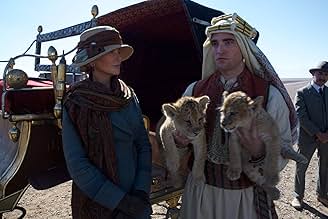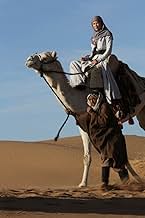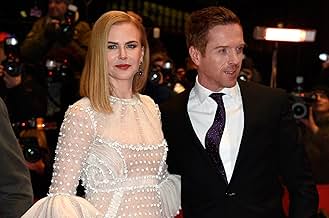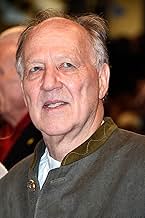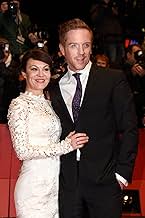VALUTAZIONE IMDb
5,7/10
13.075
LA TUA VALUTAZIONE
Una cronaca della vita di Gertrude Bell, viaggiatrice, scrittrice, archeologa, esploratrice, cartografa e rappresentante politico per l'impero britannico agli albori del XX secolo.Una cronaca della vita di Gertrude Bell, viaggiatrice, scrittrice, archeologa, esploratrice, cartografa e rappresentante politico per l'impero britannico agli albori del XX secolo.Una cronaca della vita di Gertrude Bell, viaggiatrice, scrittrice, archeologa, esploratrice, cartografa e rappresentante politico per l'impero britannico agli albori del XX secolo.
- Regia
- Sceneggiatura
- Star
- Premi
- 1 candidatura in totale
Recensioni in evidenza
I have to be blunt. Reading Gertrude Bell's Wikipedia entry arguably provides more thrills than watching Werner Herzog's misfire of a biopic. Although a contemporary and, as this film suggests, a likely friend of TE Lawrence, Queen of the Desert, doesn't even come remotely close to telling Bell's story with the same sort of grandeur and vision that David Lean achieved with Lawrence of Arabia.
Bell led a life of adventure and achievement, in a range of diverse locations and across a variety of disciplines that Herzog doesn't really even attempt to explore. Hell, the woman even had an interesting death (as far as deaths can be interesting I suppose). He only focuses his cameras on Bell's middle eastern travels. But then makes the mistake of trying to define much of Bell's life through a couple of failed and unfulfilled love encounters with men associated with diplomatic posts. A great deal of onscreen time is spent in various embassies and at different functions, that I'm afraid I consider time just wasted.
When Herzog finally decides to turn to the desert, we are presented with some breath-taking, but often quite brief scenes. We see her begin to interrelate with a number of Bedouin tribes in abrupt, fairly forgettable exchanges, which never succeed in portraying how she ended up being such an influentially historical figure in the region, whose reputation rivalled that of Lawrence himself. Then there are factual inaccuracies that Herzog allows/makes for no real artistic objectives. Basic things such as her being confined to Ha'il for 11 days, not over 3 weeks as mentioned in the dialogue. Occasional years and dates are mentioned onscreen, but shouldn't be taken too seriously. Using the film's timeline, the film appears to begin in 1902, when an obviously young Gertrude first achieves her ambition of travelling east due to her influential father. The only trouble with that is, by this time she was actually 34 and had made copious trips to the Middle East.
Queen of the Desert was both a critical failure and a rather huge commercial flop. It's such a shame that $36 million should be wasted on a movie that doesn't really begin to explore what made this independent, intelligent woman ahead of her times tick.
Bell led a life of adventure and achievement, in a range of diverse locations and across a variety of disciplines that Herzog doesn't really even attempt to explore. Hell, the woman even had an interesting death (as far as deaths can be interesting I suppose). He only focuses his cameras on Bell's middle eastern travels. But then makes the mistake of trying to define much of Bell's life through a couple of failed and unfulfilled love encounters with men associated with diplomatic posts. A great deal of onscreen time is spent in various embassies and at different functions, that I'm afraid I consider time just wasted.
When Herzog finally decides to turn to the desert, we are presented with some breath-taking, but often quite brief scenes. We see her begin to interrelate with a number of Bedouin tribes in abrupt, fairly forgettable exchanges, which never succeed in portraying how she ended up being such an influentially historical figure in the region, whose reputation rivalled that of Lawrence himself. Then there are factual inaccuracies that Herzog allows/makes for no real artistic objectives. Basic things such as her being confined to Ha'il for 11 days, not over 3 weeks as mentioned in the dialogue. Occasional years and dates are mentioned onscreen, but shouldn't be taken too seriously. Using the film's timeline, the film appears to begin in 1902, when an obviously young Gertrude first achieves her ambition of travelling east due to her influential father. The only trouble with that is, by this time she was actually 34 and had made copious trips to the Middle East.
Queen of the Desert was both a critical failure and a rather huge commercial flop. It's such a shame that $36 million should be wasted on a movie that doesn't really begin to explore what made this independent, intelligent woman ahead of her times tick.
This film was an attractive costume drama which would not have been out of place on Masterpiece Theater, but anyone familiar with Gertrude Bell's achievements and who has read the book 'Desert Queen', will be disappointed at how much was left out. Yes, she was born to a wealthy family, had a brilliant mind, earned a first class degree at Oxford - even attending Oxford was a rarity for a woman at that time. She mixed in the best society being very well connected socially, and also enjoyed the company of many intellectuals of the day. Yes, she fell in love with Henry Cadogan and mourned his death for seven years. She had been prevented from marrying him by her overly possessive parents on some very flimsy grounds - he was a gambler and had no fortune, when they could have easily set up a trust fund for her which he could not touch. Her parents apparently even opened her mail to ensure that she was not being led astray. Her dutiful devotion and love for her parents may have caused her later infatuations and unrequited love for the wrong men.
Her friendship with the married Doughty Wiley was shown, as was her iffy working relationship with T. E. Lawrence who supported her while being quite catty behind her back, but her later unrequited love for Henry Fitzsimmons, who used her but refused flat out to marry her, was not. Nor was her long and very close friendship with King Faisal of Iraq, which began when he was Prince and whom she had been instrumental in supporting on the throne. As Faisal's wife and family remained in Mecca and Gertrude became his close adviser, many suspected that they were lovers.
Her years of round the world tours to get over Henry's death were left out. Eventually she began her journeys through the middle east and gained the knowledge which put her in the center of things in WWI as a source of information about the Arab tribes, and supporter and close adviser to King Faisal. She was present at the Paris Peace Conference when the winners, desperate to get their hands on the oil, divided up the middle east between them, largely reneging on the promises to allow the Arabs their own kingdom and instead installing puppet kingdoms under British and French mandates.
The film ended with a very brief meeting with Faisal and his brother Abdullah, and an epilogue about the creation of Syria, Iraq and Saudi Arabia where Gertrude Bell had helped define the borders and choose the rulers. But there was much more to the story. After the heady success of helping to create the modern middle eastern kingdoms, being appointed Oriental Secretary awarded the CBE, and being Faisal's right hand woman, called upon every day not only for advice, but companionship, games, tennis, Gertrude found herself becoming less and less important as her task had ended. It probably did not help that she was a woman and had trodden on quite a few toes on the way up. Men would have felt threatened by her and wives would have been jealous. She concentrated her efforts on her writing and establishing the Baghdad Museum, but her life had become empty and no doubt she felt unwanted and useless. Faisal saw less of her and spent more time in Europe 'taking the cures'. Her family fortune disappeared in the post war changing times and she was reduced to living alone if not in poverty, but 'straightened circumstances'. In 1926 she died of an overdose of sleeping pills, which was ruled an accident.
Other than leaving half the story out, the other serious flaw was the miscasting of Faisal and Abdullah and their very brief appearance at the close of the film. The two actors should have switched parts. Abdullah, the great grandson of today's King of Jordan, was short and round faced, Faisal was tall, thin, charismatic and extremely handsome. His leadership of the Arab revolt was the reason for the allied win over the Turks. From the film one would think she had only met with Faisal for one minute. Showing more of her relationship with Faisal would have perked up the film enormously.
Overall, this topic should have been a Masterpiece Theater miniseries running for at least six hours.
Her friendship with the married Doughty Wiley was shown, as was her iffy working relationship with T. E. Lawrence who supported her while being quite catty behind her back, but her later unrequited love for Henry Fitzsimmons, who used her but refused flat out to marry her, was not. Nor was her long and very close friendship with King Faisal of Iraq, which began when he was Prince and whom she had been instrumental in supporting on the throne. As Faisal's wife and family remained in Mecca and Gertrude became his close adviser, many suspected that they were lovers.
Her years of round the world tours to get over Henry's death were left out. Eventually she began her journeys through the middle east and gained the knowledge which put her in the center of things in WWI as a source of information about the Arab tribes, and supporter and close adviser to King Faisal. She was present at the Paris Peace Conference when the winners, desperate to get their hands on the oil, divided up the middle east between them, largely reneging on the promises to allow the Arabs their own kingdom and instead installing puppet kingdoms under British and French mandates.
The film ended with a very brief meeting with Faisal and his brother Abdullah, and an epilogue about the creation of Syria, Iraq and Saudi Arabia where Gertrude Bell had helped define the borders and choose the rulers. But there was much more to the story. After the heady success of helping to create the modern middle eastern kingdoms, being appointed Oriental Secretary awarded the CBE, and being Faisal's right hand woman, called upon every day not only for advice, but companionship, games, tennis, Gertrude found herself becoming less and less important as her task had ended. It probably did not help that she was a woman and had trodden on quite a few toes on the way up. Men would have felt threatened by her and wives would have been jealous. She concentrated her efforts on her writing and establishing the Baghdad Museum, but her life had become empty and no doubt she felt unwanted and useless. Faisal saw less of her and spent more time in Europe 'taking the cures'. Her family fortune disappeared in the post war changing times and she was reduced to living alone if not in poverty, but 'straightened circumstances'. In 1926 she died of an overdose of sleeping pills, which was ruled an accident.
Other than leaving half the story out, the other serious flaw was the miscasting of Faisal and Abdullah and their very brief appearance at the close of the film. The two actors should have switched parts. Abdullah, the great grandson of today's King of Jordan, was short and round faced, Faisal was tall, thin, charismatic and extremely handsome. His leadership of the Arab revolt was the reason for the allied win over the Turks. From the film one would think she had only met with Faisal for one minute. Showing more of her relationship with Faisal would have perked up the film enormously.
Overall, this topic should have been a Masterpiece Theater miniseries running for at least six hours.
Obviously the director of this movie does not understand the context of the middle east and he is taking this part of the world as a bulk and treating it as a whole. When in Tehran they speak Arabic, Tehran is in Iran they speak Farisi not Arabic, when in the market one guy is obviously Moroccan while the movie is narrating a middle eastern story (Amman Jordan) different dialect, and the Beddouin music always starting with Allah W Akbar which is a religious chant not necessarily specific to the middle east where you can find Christians, Kurds and a lot more ethnicity. To make long story short the director reflected his understanding of the ME based on orientalist concepts and not real facts.
Queen of the Desert (2015)
* 1/2 (out of 4)
Nicole Kidman plays Gertrude Bell, the legendary British woman who would tackle various things in her lifetime and she would become one of the most loved figures in history. This Werner Herzog biography would make you think the only thing she accomplished was dating the wrong men.
Herzog is one of my favorite directors and I think everyone was excited when they learned that he was making another feature film and that he was going to be getting an actress like Kidman. The film would eventually hear boos at various screenings and it would limp into American theaters two years after it was first released. It would get some of the worst reviews of the director's career and it only managed to get back $2 million of its $36 million dollar budget.
QUEEN OF THE DESERT isn't as awful as some people have made it out to be but at the same time you can't help but call it a complete misfire on many levels. I think the majority of the blame has to go to Herzog's screenplay because this is a film about one of the most interesting women in the world and yet there's nothing interesting about her told here. For the life of me I can't figure out why this film only looks at her love life and outside of some narration, we'd never know what made her special.
I'm pretty sure Herzog was wanting to make an old'fashion epic with a strong leading lady. The problem here is that the screenplay is just deadly boring and none of the emotions the film works for are ever gotten. There's no romance, no drama, no comedy. There's really nothing here to be connected to and you basically just sit there wondering how such a film could go so wrong. At 128-minutes the film really drags in spots and it's just a real shame that the end result was so bland.
There are some good things to be said. The cinematography and music score are both extremely good. The locations used look terrific and there's no question that there are some beautiful visuals to look at. I'd also argue that Kidman was very good in the role and delivers a good performance but there's just nothing on the page for her to work with. James Franco is okay in his role and Robert Pattinson is good in the part of T.E. Lawrence.
QUEEN OF THE DESERT is sadly a film that will probably be remembered for it bombing at the box office and it coming from a legendary director. Herzog has done so many wonderful films in his life that you'd think this here would have been a sure thing but sadly it was a major bust.
* 1/2 (out of 4)
Nicole Kidman plays Gertrude Bell, the legendary British woman who would tackle various things in her lifetime and she would become one of the most loved figures in history. This Werner Herzog biography would make you think the only thing she accomplished was dating the wrong men.
Herzog is one of my favorite directors and I think everyone was excited when they learned that he was making another feature film and that he was going to be getting an actress like Kidman. The film would eventually hear boos at various screenings and it would limp into American theaters two years after it was first released. It would get some of the worst reviews of the director's career and it only managed to get back $2 million of its $36 million dollar budget.
QUEEN OF THE DESERT isn't as awful as some people have made it out to be but at the same time you can't help but call it a complete misfire on many levels. I think the majority of the blame has to go to Herzog's screenplay because this is a film about one of the most interesting women in the world and yet there's nothing interesting about her told here. For the life of me I can't figure out why this film only looks at her love life and outside of some narration, we'd never know what made her special.
I'm pretty sure Herzog was wanting to make an old'fashion epic with a strong leading lady. The problem here is that the screenplay is just deadly boring and none of the emotions the film works for are ever gotten. There's no romance, no drama, no comedy. There's really nothing here to be connected to and you basically just sit there wondering how such a film could go so wrong. At 128-minutes the film really drags in spots and it's just a real shame that the end result was so bland.
There are some good things to be said. The cinematography and music score are both extremely good. The locations used look terrific and there's no question that there are some beautiful visuals to look at. I'd also argue that Kidman was very good in the role and delivers a good performance but there's just nothing on the page for her to work with. James Franco is okay in his role and Robert Pattinson is good in the part of T.E. Lawrence.
QUEEN OF THE DESERT is sadly a film that will probably be remembered for it bombing at the box office and it coming from a legendary director. Herzog has done so many wonderful films in his life that you'd think this here would have been a sure thing but sadly it was a major bust.
Gertrude Bell is one of the most remarkable people (of either sex) to have ever lived...but you wouldn't know it from this film. Archaeologist, mountain climber, poet, translator, linguist, explorer, diplomat, spy, (to name just a handful of her many accomplishments) and all in a time in which women were virtually prohibited from doing any of those things, for the most part, and in territories that even men of the time feared to tread. In addition to being the world's expert on both Sunni and Shiite relations before, during and after WWII, she was charged with drawing up the boundaries for modern day Iraq. She was respected, admired and desired.
But, since she was female, it took nearly a decade to green light a movie on her life and then some man decides to make her life story an epic "romance" and, of course, make the MEN in her life central to her story. How heartbreaking that her story was so terribly contrived to conform to Hollywood's stereotypes about women and women's lives. And how more tragic that this film could not even find a U.S. distributer as of this writing. This is why we live in a world that thinks women make little to no contributions to history. We rarely tell their stories and when we do, we stuff the round peg of a remarkable life into the square hole of Hollywood sexist tropes, believing no one wants to see a film with a female protagonist unless she's spending at least half the movie pining over some man in order to feel whole.
While the movie does cover many of her remarkable accomplishments, my beef with the film is the need to weigh her story down with overly melodramatic, poorly written scenes of tragic love instead of celebrating a superlative life of unique and notable triumphs. I wanted to see more on her travels, her discoveries, her diplomacy, her efforts during the war. Just gender flip this film (although it would be hard to find a man of history as accomplished in multiple fields as she was) and you'll see how ridiculous is the script's focus on what was only one facet of the brilliant gem that was Gertrude Bell.
I urge anyone interested in history to read about this woman's life. Desert Queen: The Extraordinary Life of Gertrude Bell, by Janet Wallach is a great biography.
Hollywood has perfected the fine art of trivializing and "romanticizing" women's history...yet again.
But, since she was female, it took nearly a decade to green light a movie on her life and then some man decides to make her life story an epic "romance" and, of course, make the MEN in her life central to her story. How heartbreaking that her story was so terribly contrived to conform to Hollywood's stereotypes about women and women's lives. And how more tragic that this film could not even find a U.S. distributer as of this writing. This is why we live in a world that thinks women make little to no contributions to history. We rarely tell their stories and when we do, we stuff the round peg of a remarkable life into the square hole of Hollywood sexist tropes, believing no one wants to see a film with a female protagonist unless she's spending at least half the movie pining over some man in order to feel whole.
While the movie does cover many of her remarkable accomplishments, my beef with the film is the need to weigh her story down with overly melodramatic, poorly written scenes of tragic love instead of celebrating a superlative life of unique and notable triumphs. I wanted to see more on her travels, her discoveries, her diplomacy, her efforts during the war. Just gender flip this film (although it would be hard to find a man of history as accomplished in multiple fields as she was) and you'll see how ridiculous is the script's focus on what was only one facet of the brilliant gem that was Gertrude Bell.
I urge anyone interested in history to read about this woman's life. Desert Queen: The Extraordinary Life of Gertrude Bell, by Janet Wallach is a great biography.
Hollywood has perfected the fine art of trivializing and "romanticizing" women's history...yet again.
Lo sapevi?
- QuizOn their first day of filming, James Franco and Nicole Kidman climbed a tower, where a vulture sat. Prior to filming the scene, Werner Herzog had found the vulture by coincidence, with its owner, by the side of the road and decided to put it into the film. The vulture was not trained for such screen roles, and tried to peck Kidman, but luckily it was on a leash. This scene is one of Kidman's favorite in the film.
- BlooperGertrude Bell and Winston Churchill 's wife Clementine were cousins on her father's side i.e. via his sister. In spite of the first scene where Churchill asks "Who is this Gertrude Bell?", in real-life he was very much aware of who she was.
- Citazioni
Gertrude Bell: Nightingale with drops in heart bleed. A fed red rose. Then came the wind. And catching her, jealous branches. I have coiled heart with a hundred thorns
- Curiosità sui creditiThe credits are shown over footage of sand blowing across the desert.
- Versioni alternativeA new cut with a running time of 110 minutes was presented at the AFI Fest in Los Angeles on Nov.8 2015. The original version, which premiered in Feb. 2015 at the Berlinale and was released in some countries, has a running time of 128 minutes.
- ConnessioniFeatured in Werner Herzog: Radical Dreamer (2022)
- Colonne sonoreLes Nubiemes Valse
from the ballet "Faust"
Written by Charles Gounod
Performed by Vaughan Jones and The Manor House String Ensemble
I più visti
Accedi per valutare e creare un elenco di titoli salvati per ottenere consigli personalizzati
- How long is Queen of the Desert?Powered by Alexa
Dettagli
- Data di uscita
- Paesi di origine
- Siti ufficiali
- Lingue
- Celebre anche come
- The Queen of the Desert
- Luoghi delle riprese
- Ait Benhaddou, Marocco(exteriors caravan scene)
- Aziende produttrici
- Vedi altri crediti dell’azienda su IMDbPro
Botteghino
- Budget
- 15.000.000 USD (previsto)
- Lordo in tutto il mondo
- 1.592.853 USD
- Tempo di esecuzione2 ore 8 minuti
- Colore
- Proporzioni
- 2.35 : 1
Contribuisci a questa pagina
Suggerisci una modifica o aggiungi i contenuti mancanti



